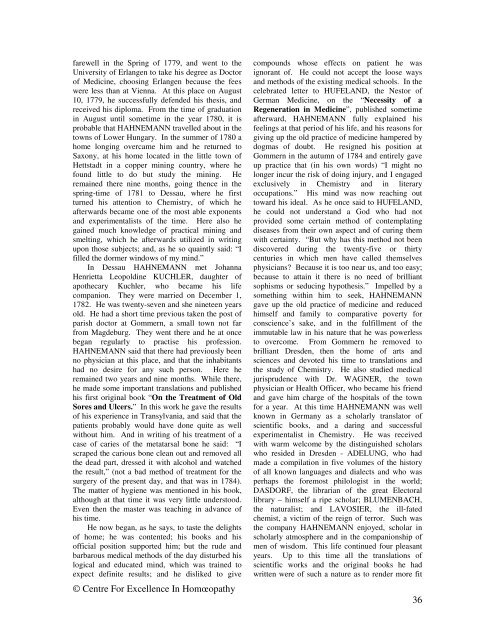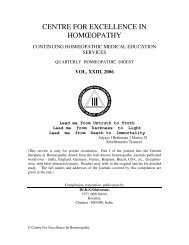You also want an ePaper? Increase the reach of your titles
YUMPU automatically turns print PDFs into web optimized ePapers that Google loves.
farewell in the Spring of 1779, and went to the<br />
University of Erlangen to take his degree as Doctor<br />
of Medicine, choosing Erlangen because the fees<br />
were less than at Vienna. At this place on August<br />
10, 1779, he successfully defended his thesis, and<br />
received his diploma. From the time of graduation<br />
in August until sometime in the year 1780, it is<br />
probable that HAHNEMANN travelled about in the<br />
towns of Lower Hungary. In the summer of 1780 a<br />
home longing overcame him and he returned to<br />
Saxony, at his home located in the little town of<br />
Hettstadt in a copper mining country, where he<br />
found little to do but study the mining. He<br />
remained there nine months, going thence in the<br />
spring-time of 1781 to Dessau, where he first<br />
turned his attention to Chemistry, of which he<br />
afterwards became one of the most able exponents<br />
and experimentalists of the time. Here also he<br />
gained much knowledge of practical mining and<br />
smelting, which he afterwards utilized in writing<br />
upon those subjects; and, as he so quaintly said: “I<br />
filled the dormer windows of my mind.”<br />
In Dessau HAHNEMANN met Johanna<br />
Henrietta Leopoldine KUCHLER, daughter of<br />
apothecary Kuchler, who became his life<br />
companion. They were married on December 1,<br />
1782. He was twenty-seven and she nineteen years<br />
old. He had a short time previous taken the post of<br />
parish doctor at Gommern, a small town not far<br />
from Magdeburg. They went there and he at once<br />
began regularly to practise his profession.<br />
HAHNEMANN said that there had previously been<br />
no physician at this place, and that the inhabitants<br />
had no desire for any such person. Here he<br />
remained two years and nine months. While there,<br />
he made some important translations and published<br />
his first original book “On the Treatment of Old<br />
Sores and Ulcers.” In this work he gave the results<br />
of his experience in Transylvania, and said that the<br />
patients probably would have done quite as well<br />
without him. And in writing of his treatment of a<br />
case of caries of the metatarsal bone he said: “I<br />
scraped the carious bone clean out and removed all<br />
the dead part, dressed it with alcohol and watched<br />
the result,” (not a bad method of treatment for the<br />
surgery of the present day, and that was in 1784).<br />
The matter of hygiene was mentioned in his book,<br />
although at that time it was very little understood.<br />
Even then the master was teaching in advance of<br />
his time.<br />
He now began, as he says, to taste the delights<br />
of home; he was contented; his books and his<br />
official position supported him; but the rude and<br />
barbarous medical methods of the day disturbed his<br />
logical and educated mind, which was trained to<br />
expect definite results; and he disliked to give<br />
© Centre For Excellence In Homœopathy<br />
compounds whose effects on patient he was<br />
ignorant of. He could not accept the loose ways<br />
and methods of the existing medical schools. In the<br />
celebrated letter to HUFELAND, the Nestor of<br />
German Medicine, on the “Necessity of a<br />
Regeneration in Medicine”, published sometime<br />
afterward, HAHNEMANN fully explained his<br />
feelings at that period of his life, and his reasons for<br />
giving up the old practice of medicine hampered by<br />
dogmas of doubt. He resigned his position at<br />
Gommern in the autumn of 1784 and entirely gave<br />
up practice that (in his own words) “I might no<br />
longer incur the risk of doing injury, and I engaged<br />
exclusively in Chemistry and in literary<br />
occupations.” His mind was now reaching out<br />
toward his ideal. As he once said to HUFELAND,<br />
he could not understand a God who had not<br />
provided some certain method of contemplating<br />
diseases from their own aspect and of curing them<br />
with certainty. “But why has this method not been<br />
discovered during the twenty-five or thirty<br />
centuries in which men have called themselves<br />
physicians? Because it is too near us, and too easy;<br />
because to attain it there is no need of brilliant<br />
sophisms or seducing hypothesis.” Impelled by a<br />
something within him to seek, HAHNEMANN<br />
gave up the old practice of medicine and reduced<br />
himself and family to comparative poverty for<br />
conscience’s sake, and in the fulfillment of the<br />
immutable law in his nature that he was powerless<br />
to overcome. From Gommern he removed to<br />
brilliant Dresden, then the home of arts and<br />
sciences and devoted his time to translations and<br />
the study of Chemistry. He also studied medical<br />
jurisprudence with Dr. WAGNER, the town<br />
physician or Health Officer, who became his friend<br />
and gave him charge of the hospitals of the town<br />
for a year. At this time HAHNEMANN was well<br />
known in Germany as a scholarly translator of<br />
scientific books, and a daring and successful<br />
experimentalist in Chemistry. He was received<br />
with warm welcome by the distinguished scholars<br />
who resided in Dresden - ADELUNG, who had<br />
made a compilation in five volumes of the history<br />
of all known languages and dialects and who was<br />
perhaps the foremost philologist in the world;<br />
DASDORF, the librarian of the great Electoral<br />
library – himself a ripe scholar; BLUMENBACH,<br />
the naturalist; and LAVOSIER, the ill-fated<br />
chemist, a victim of the reign of terror. Such was<br />
the company HAHNEMANN enjoyed, scholar in<br />
scholarly atmosphere and in the companionship of<br />
men of wisdom. This life continued four pleasant<br />
years. Up to this time all the translations of<br />
scientific works and the original books he had<br />
written were of such a nature as to render more fit<br />
36




